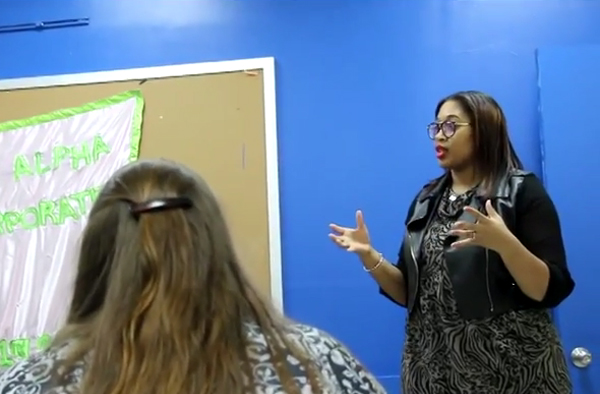
Photo by: FPA
Sylvia Hooper, one of the co-founders of Foster and Progressive Advocacy or FPA.
Randy Pearson, 18, counts on his fingers the number of foster homes he’s been in since age 10. He taps his fingers against his thigh—one light thump for each new foster-care parent.
There was the woman who, except when she cooked on Wednesdays and Sundays, offered him only waffles and cereal. There was the house where dogs ran wild. Each time he had problems with a home it took several calls before his foster agency, Christian Guardian in the Bronx, responded, he says. (The agency did not respond to requests for comment.)
Pearson stops counting when he runs out of fingers.
“Ten,” he says. “Maybe 11 homes.”
Pearson is a client of Foster and Progressive Advocacy, a nonprofit organization housed in a small room in central Harlem. FPA represents foster parents, children and biological parents who feel the complaints they file with the New York City Administration for Children’s Services (ACS) or their participating foster-care agencies go unheard.
Sandra Killett, executive director of the Child Welfare Organizing Project, says there’s an increase in the number of people in the foster-care system who rely on independent organizations to advocate for them. Although ACS and the foster-care agencies they contract field complaints, Killett says they’re slow to respond, if they respond at all.
“You use the chain of command,” says Killett, filing a complaint first with the specific agency, and then next with ACS, which contracts with each agency. But, says Killett, ACS is the end of the line, and no one is coordinating their response to the feedback.
“The way the system has been set up, no one has pushed ACS to respond to foster-care complaints and foster parent complaints,” says Killett.
According to the 2014 Mayor’s Management Report on city agencies, the agency responded in two weeks to nearly all of the emails and letters they received—a significant improvement over 2011, when ACS responded in two weeks’ time to 46 percent of emails and 45 percent of letters.
Under a new commissioner, former New York State Office of Children and Family Services commissioner Gladys Carrión, ACS says in response to questions that they are reviewing their “policies and practices with regards to how the agency responds to concerns and complaints from young people, families and parents.”
For Tracy Breaker, a foster-care parent trying to get custody of her nephew, Lorenzo, 10, the unresponsiveness of ACS means she’s had to become her own advocate. Breaker hauls around with her a shopping bag full of letters and documents she’s collected over the past two years of fighting to get her nephew into her home.
Lorenzo, who has been in foster care since age 5 when he was removed from his mother’s custody because of her drug use, is in foster care in Brooklyn through MercyFirst, a private agency that contracts with ACS. MercyFirst did not respond to a call for comment.
Breaker came to FPA for help two years ago.
“I’m just fighting hard to get my nephew home where he belongs,” she says.
Dorin Matthews co-founded FPA in 2008 after she left her job as a foster parent advocate with the city when she felt torn between an agency that didn’t listen and parents who had a lot to say.
“As long as I worked under [ACS], I couldn’t advocate,” says Matthews, who was a foster-care parent to her two nephews before she adopted them. “It’s a conflict of interest.”
She felt she could advocate louder by starting her own organization.
On a recent Saturday afternoon, FPA’s members—all of them foster-care parents or children who have aged out of foster care—gathered at the organization’s West 141st St. office for their weekly meeting. Posters from past FPA rallies cover the walls, along with a lone Obama election sign.
Killett at the Child Welfare Organizing Project says that fear keeps most parents or foster-care children from filing complaints; if the agency has your child in its hands, or wields the power to choose your future home placement, you’re afraid to speak out.
At the meeting Saturday in Harlem, a dozen members sat in foldout chairs. To start the meeting, all the foster parents or children introduced themselves and summarized their stories. A flat-screen TV hung above their heads, playing homemade videos of Matthews speaking about the organization’s most recent cases—this time Breaker and Lorenzo’s case, her voice nearly muted by the remote.
“I just wanted to bring some awareness about a case I have…” said Matthews, talking into her computer’s built-in camera. “This is a family that has been torn apart by a system that claims to protect and unite families,” she said. “We need to hold these agencies accountable and this has to stop.”
City Limits coverage of child welfare is supported by the Ira W. DeCamp Foundation.








